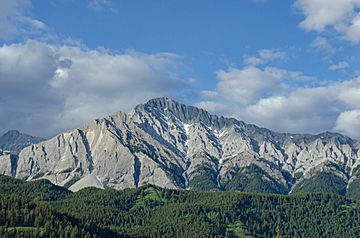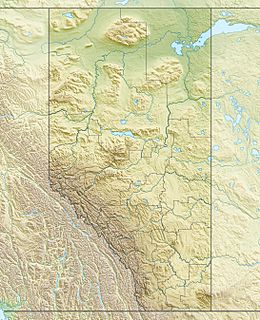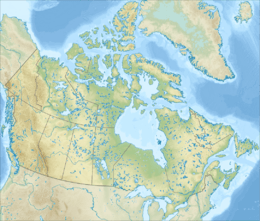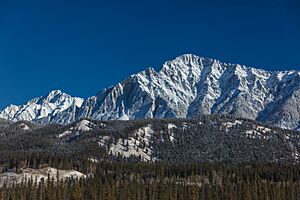Mount Ishbel facts for kids
Quick facts for kids Mount Ishbel |
|
|---|---|

Mount Ishbel
|
|
| Highest point | |
| Elevation | 2,908 m (9,541 ft) |
| Prominence | 431 m (1,414 ft) |
| Geography | |
| Location | Banff National Park Alberta, Canada |
| Parent range | Sawback Range Canadian Rockies |
| Topo map | NTS 82O/05 |
| Climbing | |
| First ascent | 1933 J. Packer, D. Day, V. Waters, J. Farish, W. Innes, L DeCouteur, J. Sterlling guided by Lawrence Grassi |
Mount Ishbel is a tall mountain peak located in Banff National Park in Alberta, Canada. It's part of the Sawback Range within the amazing Canadian Rockies. You can find it north of the Bow Valley Parkway and east of Johnston Canyon.
The mountain got its name in 1956. It was named after Ishbel MacDonald, who was the oldest daughter of Ramsay MacDonald. He was the Prime Minister of Great Britain a long time ago. Mount Ishbel also gives its name to a group of rocks called the Ishbel Group. These rocks are an important part of the Western Canadian Sedimentary Basin, which is a huge area where many layers of rock have formed over millions of years.
Mount Ishbel is also famous because it was painted by Lawren Harris. He was a member of the Group of Seven, a famous group of Canadian landscape painters. His painting of the mountain is called Mountain Forms.
What is the Climate Like on Mount Ishbel?
Mount Ishbel is in a subarctic climate zone. This means it has very cold and snowy winters. The summers are usually mild, which means they are not too hot and not too cold.
During the winter, temperatures can drop really low, sometimes even below −20 °C. With the wind blowing, it can feel even colder, like −30 °C or less! This type of climate is common in areas far from the equator, where winters are long and cold.
How Was Mount Ishbel Formed?
Just like other mountains in Banff National Park, Mount Ishbel is made up of sedimentary rock. This type of rock forms from layers of sand, mud, and tiny bits of sea creatures that settle at the bottom of ancient seas. Over millions of years, these layers get pressed together and turn into solid rock.
The rocks that make up Mount Ishbel were formed during different time periods, from the Precambrian era all the way to the Jurassic period. The Precambrian era was billions of years ago, and the Jurassic period was when dinosaurs roamed the Earth!
Later, a huge event called the Laramide orogeny happened. This was a time when massive forces deep within the Earth pushed and folded these rock layers. Imagine pushing a rug from both ends – it would wrinkle up. That's kind of what happened to the Earth's crust! This pushing caused the sedimentary rock to move eastward and pile up, forming the tall mountains we see today, including Mount Ishbel.
 | Madam C. J. Walker |
 | Janet Emerson Bashen |
 | Annie Turnbo Malone |
 | Maggie L. Walker |




